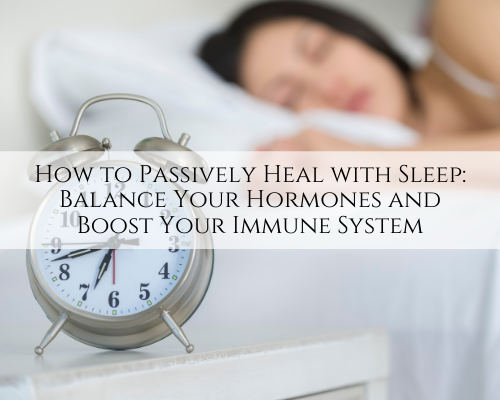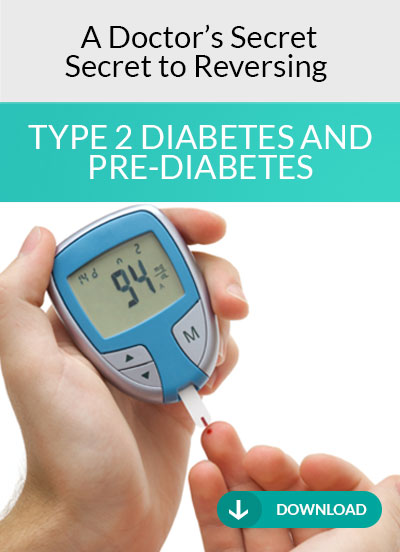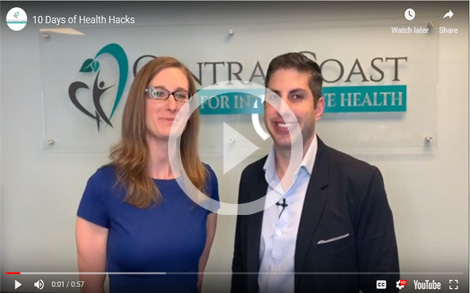Sleep. What is it good for? A lot actually and good sleep can be hard to come by for some people. In fact, according to the CDC – one-third of Americans aren’t getting enough sleep each night. Furthermore, lack of good sleep is linked to several chronic diseases including diabetes, depression, and heart disease. It is recommended by the American Academy of Sleep Medicine that adults get 7 hours of sleep or more per night. Many are getting less than that, also, the sleep they get isn’t restful. Let’s talk about healing yourself by improving your sleep hygiene so you can passively heal your body each night.
What is Restful Sleep?
Have you ever spent the night tossing and turning, only to wake up suddenly and then have difficulty getting back to sleep? What about insomnia? It is normal to experience this occasionally, however, do you experience this frequently? Often when we are diagnosed with insomnia – we may turn to prescription medication for it, which may help at first but doesn’t solve the root cause of poor sleep and can lead to a dependency on sleep medications. Sleep is extremely important for immune health and autoimmune diseases, as well as allowing your body to rest and repair.
Restful sleep means
- When you awaken, you feel rejuvenated and not tired.
- You can get 7 + hours of sleep a night without waking up multiple times.
- You feel rested and energetic during the day and tired at night.
- Your body can go through different sleep cycles including deep sleep each night.
- You can fall asleep quickly when you lay down in bed, instead of waiting hours.
What Happens if You Get Insufficient Sleep?
Not getting adequate sleep has been linked to chronic diseases including:
- Autoimmune diseases
- Diabetes
- Heart disease
- Obesity
- Stroke
- Depression
*Lack of sleep can also impair driving and cause injuries from machinery accidents.
The Sleep Cycle
Sleep is something everyone spends one-third of their life doing. Sleep may seem simple, but it is also a complicated function of the body that is necessary to feel our best, reduce the risk of disease, and help our brain function properly so we can think, process memories, and focus throughout the day.
We all have an internal clock of sorts that keeps us on track and functioning properly all day and night. Our circadian rhythms are 24-hour clocks running in the background to carry out essential processes and activities. One of the most well-known circadian rhythms is the sleep-wake cycle. It is responsible for giving us energy and alertness in the morning and afternoon. At night, it lets us know we are tired and facilitates restful sleep. We sleep in four stages: the first three stages in NREM or non-rapid eye movement, and the fourth stage is REM or rapid eye movement.
During REM, we consolidate our memory converting what we learn to long-term memories. Even better, this is the time when we fall into a deeper sleep and dream.
Sleep and Our Immune Function
Sleep deprivation and poor immune function go hand in hand. Our body is responsible for keeping our sleep-wake-sleep cycle in working order – how? Our hormones and neurotransmitters. Our hormones are released throughout the day to tell our body when to sleep and when not to sleep. If we don’t get enough sleep, our hormones cannot do their job. When our hormones cannot do their job and sleep quality is poor, issues with immune system function can arise. Neurotransmitters such as serotonin and melatonin work in sync with hormones to make us sleepy or awake at the right times.
You may have heard of cytokines before – these are the chemicals that act as cell messengers and our immune system produces them to fight infection. Cytokines also happen to be sleep-inducing as well. While you sleep, your body saves energy and gives your immune system the resources it needs to keep you healthy. Our neurons that control sleep interact closely with our immune system, according to the National Institute of Neurological Disorders and Stroke.
Sleep deprivation can have a direct impact on our immune system. In fact, missing sleep can “confer or hasten the development” of an autoimmune disease. That’s because T cells or Treg cells may misbehave when sleep is scarce. These are the cells that our immune response relies on to maintain self-tolerance. So, having healthy sleep is critical to prevent or reverse autoimmune diseases. Sleep issues can also be a warning sign of an autoimmune disorder – including daytime sleepiness and chronic fatigue.
Some sleep problems for autoimmunity include:
- Pain – autoimmune disease can cause frequent muscle and joint pain – this pain can disrupt sleep and reduce the quality of your sleep.
- Mental health – depression, stress and anxiety can be associated with autoimmune disease as well as sleep disorders.
- Inflammatory cytokines – are associated with autoimmune disease and disruptive sleep because the immune system can attack healthy cells in error, especially those with rheumatoid arthritis, lupus and multiple sclerosis. Inflammation can disrupt sleep.
- Those with obstructive sleep apnea have been linked to an increased risk of autoimmune disease. Four cytokine levels that are elevated in those with autoimmune diseases include APRIL, CD30, IFN-Alpha-2 and IL-2.
Serotonin
Serotonin is involved in our sleep cycle in a few ways, first, it is the precursor to melatonin (the sleep hormone). Second, it prevents us from entering REM sleep. Studies show that it keeps us up and induces sleep. Too much serotonin and you feel sleepy; too little and you can experience insomnia. In addition, tryptophan, the amino acid precursor to serotonin and melatonin, helps to induce sleep. Low levels of tryptophan, serotonin, or melatonin can keep you from getting a good night’s rest.
Adrenal Circadian Rhythm and Cortisol
The HPA axis (hypothalamic-pituitary-adrenal axis) influences our sleep patterns and healthy sleep has a beneficial effect on our HPA axis. The adrenal gland, which is part of the HPA axis, produces the stress hormone, cortisol. Our cortisol production follows a circadian rhythm and promotes healthy sleep-wake cycles. The production of cortisol is at its lowest at midnight (during sleep). It increases when it’s time to wake up in the morning and peaks shortly after we wake up (nearly one hour). This is also known as the cortisol awakening response (CAR) and gives us a nice boost when we get up in the morning. If you sleep in, you will miss this important energy boost – breaking your natural circadian rhythm- and making you feel groggy or not fully rested.
Melatonin
Melatonin is released in the evening and levels increase the closer you get to bedtime. As this happens, cortisol naturally decreases its levels and we feel sleepy. With the release of melatonin, we also release growth factors and growth peptides that activate our immune cells. This activation includes our T cells and natural killer cells, which are crucial to fight off infections like a virus. Sleep promotes our immune resilience.
Blood Sugar Regulation
The connection between your blood sugar levels and cortisol levels is also important. Drops and spikes in blood sugar can cause our body to be stressed and cortisol to be released. Because cortisol is a critical part of our sleep-wake cycle, this can cause issues. Problems with blood sugar can make it hard to fall back to sleep when waking in the middle of the night and can cause surges of cortisol as well. Also, there is an increase in wakefulness and a decrease in melatonin.
Good Sleep Hygiene Tips
Here are a few ways to improve your sleep and let your body heal each night:
- Go to bed at the same time each night – being consistent allows your body and hormones to know what to expect and work accordingly.
- Keep your blood sugar levels steady – avoid missing meals, eating too many foods with sugar and starch, and avoid going too long between meals. A portion of protein, fat, and/or resistant starch can help keep your blood sugar stable overnight. Plantain chips are a good snack before bed if you feel hungry because they are a resistant starch that many people like and tolerate.
- If pain is keeping you awake, we sometimes recommend oral CBD oil. It can help with the common root cause of pain – inflammation. If prolonged, it is best to consult a functional medicine doctor for an individualized testing panel to figure out the cause of the inflammation.
- Avoid blue light from electronics a few hours before bed – try reading instead. Also, lights from clocks and windows can disrupt your sleep cycle – try using a sleep mask.
- Create a comfortable sleep environment including an air purifier to minimize allergens, having good air circulation, a supportive pillow, a comfortable mattress, and use lavender as aromatherapy, as it has calming properties.
- Avoid stimulants such as nicotine, caffeine, and alcohol.
- Exercise regularly to control blood sugar, insulin levels, reduce stress, reduce the perception of pain (endorphins), and improve mood.
Go Get Those ZZZs
Contrary to popular belief, you cannot “catch up” on sleep. Sleeping is a cyclical, time-sensitive biological function that depends on hormones and neurotransmitters to support your best cognitive, immune-resilient, and stress-resilient self. Listen to your body and pay attention to when you start feeling tired. Try to get at least 7.5 hours of sleep a night – preferably at the same time each day. When you eliminate the root causes of your sleep issues, you will feel happier, more energetic, and your brain will be at top performance. If you aren’t sure of the root causes that are keeping you from a restful night’s sleep, consult your functional medicine doctor to explore the root causes of your sleep issues.
Board Certified in Integrative Medicine
Certified Functional Medicine Practitioner
Institute for Functional Medicine Certified Practitioner






